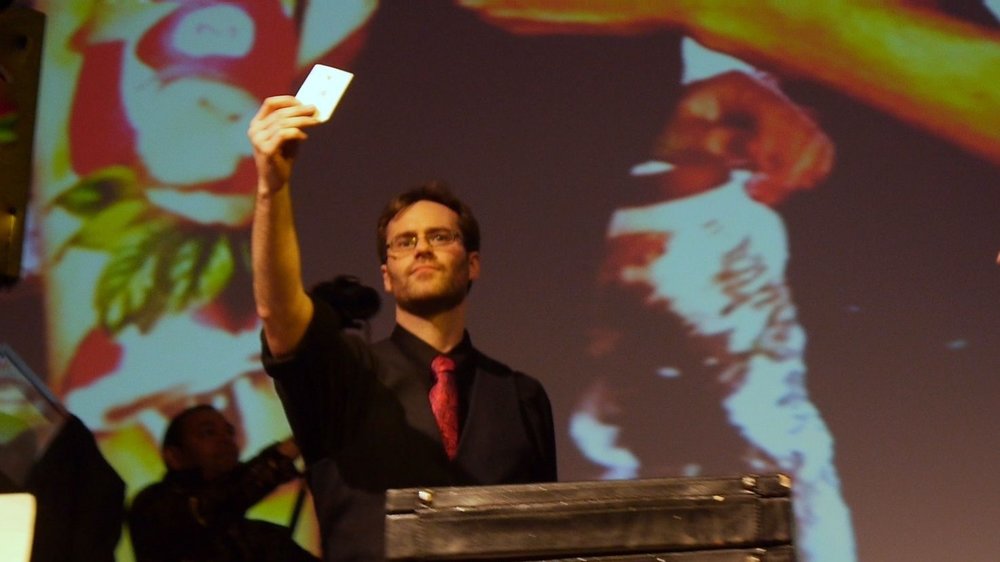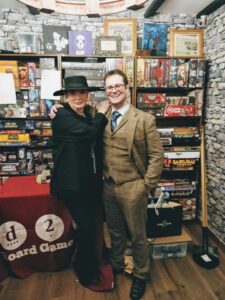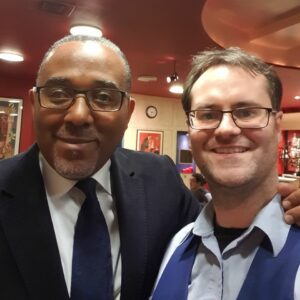
JULIA LEE BARCLAY-MORTON – YOGA, WATER AND REWRITING AUTISM
I interviewed writer Julia Lee Barclay-Morton about her experience of autism. Julia began as an experimental dramatist in New York, moving to the UK to


Interview with member of the Magic Circle Paul Regan whose show about mental health issues was a great success at the Edinburgh Festival. Paul uses humour in his magic, board games, bespoke tricks and runs courses to encourage more women to become magicians.
Leslie: How did you learn to become a magician? What kind of magic do you practise? What are the hard work aspects of the profession?
Paul: There are lots of different ways to learn magic. I learned by doing. In essence, I taught myself a few tricks, turned up at Magic Corner at Covent Garden, and started trying to be a performer. My goodness, it did not go well. Luckily two magicians, Sergio Barros and Owen Lean, were good enough to help me out. I cannot stress enough that this is not the way to learn how to be a magician. It’s hour after hour of tedium and heartbreak.
I think that the kind of magic I perform is best described as eclectic. A lot of my work is what we call close up magic, so card tricks that you can perform standing up, as well as tricks using sponge balls, silk handkerchiefs, and ropes. But I’m also lucky enough to do larger shows, which lets me involve bigger props and effects.
I know you’re probably expecting me to say that the hard work is practice; mastering some complex sleight or difficult move. But that’s easy. If I want to learn something, I just have to sit there and keep trying. Teller, of Penn and Teller, once said ‘Sometimes, magic is just someone spending more time on something than anyone else might reasonably expect.’ He’s right, that’s what we do. Practicing something I love isn’t hard. What is hard is going out and getting the gigs. Trying to get residencies can be soul destroying. Putting on shows you believe in that undersell breaks anyone’s heart. Looking at your calendar and seeing far too many gaps despite going out, looking for work, paying for advertising, all these things, that’s what’s hardest about this job.
Leslie: What’s the history of your interest in magic?
Paul: I loved watching magic growing up. Without ever studying it, I used to like trying to work out how tricks were done. But that’s as far as it went. Cut to thirty years later and I am urged to do something different. At the age of 36 I suddenly discovered the love of my life. Luckily, I do have a background in performing, having done stand up, fronted bands, and even acting as a child. All of this meant I was able to perform and earn money doing magic pretty quickly. I got lucky, most professionals aren’t able to get into magic at that late a stage in their life.

Leslie: Please tell us about the beginning, growth and development of your show ‘Illusions of Depression’. How is the show different to other magic acts?
Paul: I know a lot of people who call magic an art form. I look at it as more of a craft that can be elevated to an art, and I started wondering if that was something I could do. Could I use my craft to express myself in an artistic capacity, to create an emotional response, not just pleasantly surprise or shock my audience. That was the first step in creating ‘Illusions of Depression’.
I don’t really think of ‘Illusions’ as a magic show, it’s more of a theatre piece. With magic shows you’re usually going to see a series of tricks and illusions, sometimes bound together with a theme. With ‘Illusions’ I didn’t come up with a trick and then try to create a story for it, which is what most magicians do. Here, I was deciding on my message and then tailoring my magic to emphasise it. It’s really become something of a performance piece, with the audience able to really affect what it is I end up doing. When I was performing at the Edinburgh Fringe I realised how important what I was doing was to some of them. At one performance I had to clear the room so that I could sit and talk to one of the audience members. At another, as they left, each member of the audience hugged and thanked me. When I perform the piece I ensure I’ve got local help line details that I can give to people who request them, because I need to take this very seriously. I’m dealing with powerful, triggering subjects, and it’s important to ensure it’s not gratuitous or just there for titillation or cheap headlines.
Leslie: What lies behind your decision to work on a show about depression and autism?
Paul: I had to talk about something that matters to me, and so an obvious one was my views, thoughts, and experiences of mental health issues and autism, something that’s deeply personal, but also something that affects many of us. As I started working on that I realised I could use it as an intellectual as well as an emotional piece, helping my audience question their preconceptions on self-harm and how they view people with depression, and even question what depression actually looks like.
Leslie: What aspects of magic are therapeutic? How do you use humour in your act?
Paul: Practicing sleights is undoubtedly something that requires focus, which can be a great form of occupational therapy. Having some kind of structure or script for social interaction – which is in essence what a magic trick is – can be very helpful. But really, the most therapeutic aspect of magic is the social side. Sharing my love for magic with other magicians is great. Talking through a routine or working out a problem with friends is just great.
My performance style is just naturally humorous. I enjoy the back and forth with my audience far more than scripted one-liners, mostly allowing them to help create the funny moments.
Leslie: What are the different elements of your ‘Magical Mischief’ show?

Paul: Magical Mischief is a show I put on at the D20 Board Game Cafe in Watford every month where I get to host a guest magician as well as have fun in one of my favourite places in the world. It starts with me doing table magic for the audience, which basically means I wander around politely interrupting their meals and games and seeing if they want to see some magic. Luckily, they are usually more than happy to see some close up tricks. After that there is a quick set up and the parlour show begins. The first half is my show. I create a different half hour act every month. Which seemed like a really good idea once, but I can’t tell you just how hard it is! I also create a board game related trick as well. Each month my audience each get to nominate a board game, one is chosen at random and, in my next show, I create a magic trick using that board game. I actually love this element, and I’ve come up with some tricks I’m really proud of. After this I present the headline act. I’ve been fortunate enough to host some amazing magicians over the years, real headliners who you don’t normally get to see in such an intimate venue – the maximum number is thirty.
Leslie: How do you try to involve more girls/women as magicians? Why is the gender balance in magic circles so tipped towards men?
Paul: ‘Why’ is a really interesting question. There have always been female magicians. During the height of variety theatre female performers were doing magic in their own right, some famous ones being Adelaide Herrmann and Lulu Hurst. But more often than not then they were the magician’s assistant. This role played very much into the stereotype of the female role within a partnership being the weaker, vulnerable one. However, being a magician’s assistant requires a level of skill and dedication that most of the actual ‘magicians’ would struggle to handle. Many of these assistants have a background in dance because of the level of training necessary, both physical and mental. A better way of looking at it is really a partnership and, the better and more skilled the female side of the partnership is, the better they make the male side look. So there is this historically stereotypical idea that magicians are men, assistants are women. These days we’re still under that ghastly shadow. I do need to stress that the role of magician’s assistant really is amazingly hard, skilled, and one that I know I couldn’t do!
I have a personal theory that magic sets are bought not by parents, but by grandparents or aunts and uncles who aren’t sure what to get their nephew for Christmas or a birthday. It fits nicely into the £10 – £20 budget and is easy to wrap. A boy gets a magic set, a girl gets a doll.
Since I got into magic I’ve noticed this bias towards men. Because most magicians are male, the tools available are skewed that way. Magic wallets? No problem? Magic purses or handbags? Have you seen our pink magic wallets? If you go to a magic convention the gender balance is just boggling. I’d questioned it and asked what people are doing about it, without ever actually doing something about it myself. I suddenly realised I was expecting other people to fix the problem so I started a class called ‘Magic is for Girls’. It was a six lesson course exclusively for women to come and learn magic. In addition to creating what I hoped would be a safer space I only charge £5 a lesson which included all the necessary props and tools needed. It went really well, and most of the class have stuck with magic, and I am looking at doing it again in the future.
Leslie: Which magicians do you admire – why them?
Paul: There are so many, this might be a bit of a list but I’d urge your readers to google these people. They’re great magicians. As a child I loved the David Copperfield specials that would come on TV, and I still think he’s probably the best stage illusionist in the world. But since becoming a magician I’ve started seeing them all in a different light.
Fay Presto is perhaps the best close up magician I’ve ever seen, but she’s also the first one who took me under their wing, plus she’s incredibly generous with her time and knowledge to up and coming magicians, especially other women. That’s something that really matters to me; magicians who are great performers and help others. Another name of a supportive, generous magician who I love to watch perform that leaps straight to my mind is Chris Wood.

There are magicians whose dedication to their craft is just utterly beyond me. When I see people like Brendan Rodrigues, Ryan Hayashi, and Michael Vincent, their skill levels blow my mind. It’s great to watch these kinds of performers no matter who you are but, as a magician, knowing what they’re doing and just how much work has gone into it helps me appreciate it in a very different way. I love people who are creative. There’s Kieron Johnson, the crazy professor of magic. Or Noel Qualter who consistently comes up with magic effects I could never even dream of. What they’ve created are used by people around the world, from hobbyists to television performers and award winning magicians.
Magicians who do something truly creative or beautiful inspire me. People like Ben Heart and Diobo. They are glorious, their use of storytelling and theatre are a thrill to see and absolutely elevate magic to an art form. Jerry Sadowitz is another performer I’m in awe of. I have to mention Romany. Her stage persona of a besequined Diva of Magic is fabulous, there really is no other word for it. Plus her book ‘Spun into Gold’ was a real inspiration, and one that I would recommend to anyone, not just those interested in magic.
Finally, David Williamson is an American magician who is widely considered the single, best magician alive today and he undoubtedly is a giant. But my favourite magician is a guy called Tom Whitestone, the single, best kept secret at the Magic Circle.
Leslie: Tell us about your favourite magical trick – why that one?
Paul: My favourite trick of all time has to be the Cups and Balls, one of the oldest known tricks in the world. Apparently Houdini said that no one can call themselves a magician unless they have mastered the cups and balls. In essence, it’s three cups and three balls. In front of the audience’s eyes the balls vanish from the magician’s hand and reappear under the cups, move around without being seen, and even change into other objects. I fell in love with it doing street magic in Covent Garden. If you get the chance, spend some time watching the performers there. What they’re doing is carrying on a tradition that’s thousands of years old. I love the trick because, when done well, it’s a tour de force. It has the most fundamental effects of magic with things vanishing, reappearing, transposing, and transforming. It involves misdirection, dexterity, and sleight of hand, as well as exceptional audience management. For me, it’s the perfect microcosm of magic in one routine.
Next week I interview Gabriella Logan (Guitar Gabby) who founded and manages the all-Black Woman, Afro-rock band Txlips.
ABOUT LESLIE TATE’S BOOKS:

I interviewed writer Julia Lee Barclay-Morton about her experience of autism. Julia began as an experimental dramatist in New York, moving to the UK to

I interviewed Gillean McDougall from Glasgow, who edited the collaborative projects Honest Error (on Charles Rennie Mackintosh and his wife Margaret Macdonald) and Writing the

I interviewed French writer Delphine de Vigan, whose book, No et moi, won the prestigious Prix des libraires. Other books of hers have won a clutch

I interviewed Joanne Limburg whose poetry collection Feminismo was shortlisted for the Forward Prize for Best First Collection; another collection, Paraphernalia, was a Poetry Book Society Recommendation. Joanne

I interviewed Katherine Magnoli about The Adventures of KatGirl, her book about a wheelchair heroine, and Katherine’s journey from low self-esteem into authorial/radio success and
| Cookie | Duration | Description |
|---|---|---|
| cookielawinfo-checkbox-analytics | 11 months | This cookie is set by GDPR Cookie Consent plugin. The cookie is used to store the user consent for the cookies in the category "Analytics". |
| cookielawinfo-checkbox-functional | 11 months | The cookie is set by GDPR cookie consent to record the user consent for the cookies in the category "Functional". |
| cookielawinfo-checkbox-necessary | 11 months | This cookie is set by GDPR Cookie Consent plugin. The cookies is used to store the user consent for the cookies in the category "Necessary". |
| cookielawinfo-checkbox-others | 11 months | This cookie is set by GDPR Cookie Consent plugin. The cookie is used to store the user consent for the cookies in the category "Other. |
| cookielawinfo-checkbox-performance | 11 months | This cookie is set by GDPR Cookie Consent plugin. The cookie is used to store the user consent for the cookies in the category "Performance". |
| viewed_cookie_policy | 11 months | The cookie is set by the GDPR Cookie Consent plugin and is used to store whether or not user has consented to the use of cookies. It does not store any personal data. |
4 responses
Quite an interesting post! Watching a good magician is like watching a ballet. I once read of a magician who practiced a card trick for three years before he mastered it. What devotion. Thank you, Leslie and Paul!
Thanks, Robin. And of course the moves in classical ballet have been in the past a kind of secret knowledge passed down between practitioners. There’s something about both disciplines that is very much person to person.
I was fascinated by this interview. What an amazing man Paul is. And I was so interested in his take on the male/female roles. It brought back an incident from my own childhood when at armed forces children’s party, ‘Father Christmas’ handed out wrapped presents – blue wrapped for boys, pink for girls. I was thrilled to discover inside my pink-wrapped parcel was a magic set. Something I’d always longed for. Only to have it whipped out my hand seconds later by his sharp-eyed Christmas elf, and told a boy’s gift must have been wrapped in girl’s paper by mistake. A girl’s present was thrust into my hands – a doll dressed as a nun!
Thanks, Karen. It’s great to hear from you, and with such an interesting/revealing story!